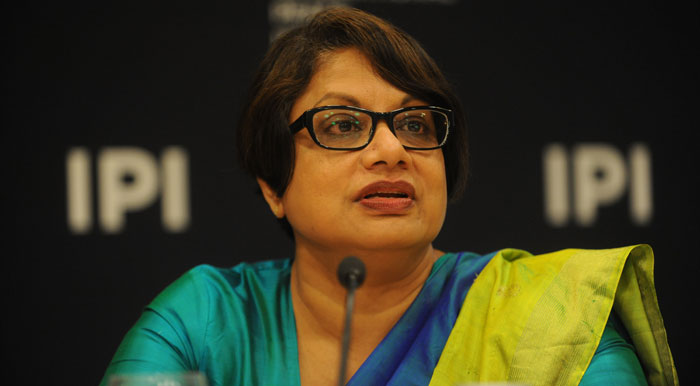
“Healing requires a partnership between lawyers and artists,” said Radhika Coomaraswamy, the outgoing Special Representative of the Secretary General (SRSG) for Children and Armed Conflict.
“Lawyers because we need justice… but artists too; a society begins to heal when its creative energy begins to flow again, both in the individual and state level.”
Ms. Coomaraswamy spoke on July 25, 2012 in an event co-hosted by the Permanent Mission of Belgium to the UN and by IPI. The event, titled “A Farewell Conversation,” would be Ms. Coomaraswamy’s last public address to the international community as SRSG for Children and Armed Conflict.
“In many ways I inherited a vision,” said Ms. Coomaraswamy. The vision called on the Security Council to play a more thematic role on issues surrounding children and armed conflict. “My task was really to implement this vision.”
In the past six years, Ms. Coomaraswamy and her office worked with UN agencies and partners to streamline their efforts to help children affected by war. Among other accomplishments, they established a monitoring and reporting system for the Security Council, created a country level task force to gather information, trained child protection teams, and implemented an action plan for perpetrators to be delisted from the Security Council list.
When asked by Jo Becker of Human Rights Watch what the biggest obstacles are for future progress, Ms. Coomaraswamy answered, “I would say the politics of the UN is the biggest obstacle… and the politics requires all of us to reassure states that this is not the end of the world, that these are important issues, and to build that trust.”
Ms. Coomaraswamy also spoke about the importance of art in the healing process of children in conflict and poverty. “Research is showing that in societies where there is no structured healing process, they’re more likely to return to war.”
Ms. Coomaraswamy shared stories of children who are healing from traumatizing experiences, including child soldiers in Sierra Leone who formed a theater company, children in Gaza and Sri Lanka who paint as therapy, and a girl in Sierra Leone who became a ballerina.
“The focus of creativity can help us overcome the horrors and destruction of war.”
In conversation with Ms. Coomaraswamy was Lukas Pairon, the General Director of the Ictus Ensemble, based in Brussels. Mr. Pairon discussed how music and art can be used as a humanitarian tool for development.
“It softens people, brings them closer to peaceful thoughts,” said Mr. Pairon.
Mr. Pairon explained that students who are actively learning an instrument also excel in other subjects. His organization donates instruments to children in impoverished areas in hopes to aid in their development.
“Artists play a very important role in creating the symbols, the climate, and space for peace and healing,” said Ms. Coomaraswamy. “I thought perhaps my last conversation should be about art.”
The event was moderated by Ambassador Jan Grauls of Belgium. Jérémie Labbé, IPI Senior Policy Analyst, gave welcoming remarks.
Watch event:







